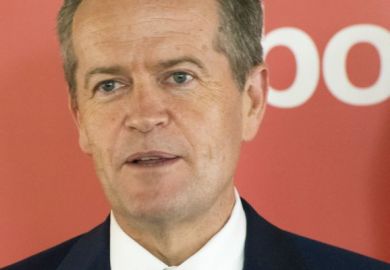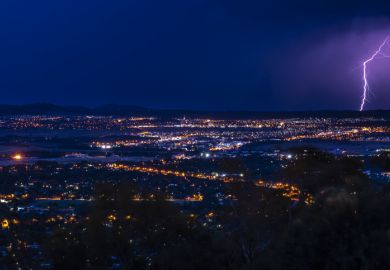One of Western Australia’s most senior judges resigned from Murdoch University’s governing body after distancing herself from its decision to procure funds for a A$105 million (£57 million) development while ripping A$25 million from its salary bill.
Carmel McLure left Murdoch’s senate in March, more than 12 months before her three-year term was due to end, amid a secretive review of the university’s governance and consternation over job losses and deteriorating work conditions.
Ms McLure had earlier dissented from the senate’s resolution to draw A$15 million from Murdoch’s A$100 million “debt facility” to fund early works on Murdoch’s long-proposed New Academic Building (NAB) project, a facelift of the university’s main Perth site that will house 60 per cent of on-campus teaching in the largest timber construction at any Australian university.
The senate had earlier resolved to more than double Murdoch’s borrowing limit to A$250 million, to cut spending on salaries by A$25 million and to adjust key performance indicators relating to Murdoch’s financial health.
The building project has split the university community, with some saying it is desperately needed to revitalise dated infrastructure and boost enrolments. Others question capital spending amid a pandemic that has ravaged university revenues and pushed teaching online – a change that Murdoch plans to make permanent for large-scale lectures.
During Covid-19, most Australian universities stopped building work unless it was near completion or there were contractual obligations to continue it. Neither circumstance applies to the NAB, on which construction began in June 2021.
Ms McLure is a former president of the Court of Appeal in the state’s Supreme Court. The first woman appointed to this role, she was also awarded Australia’s highest civic honour for her service to tertiary education, law and the arts. She did not respond to Times Higher Education’s requests for comment.
Minutes from the senate’s October 2020 meeting, in which she dissented from the decision to draw down debt, say an unidentified council member “questioned whether the NAB was still in the best interests of the university in the post-Covid-19 world”.
Murdoch said the building would enrich virtual as well as face-to-face delivery. A spokesman said the project featured “the very latest digital technology” and flexible learning spaces including more than 1,000 “informal learning seats”.
“Investment in high-quality learning environments is paramount for our student experience,” he said. “To serve the needs of our students and staff now and into the future, we need to invest in both physical and digital infrastructure.”
Murdoch’s senate is considering a report into the university’s governance by former University of Western Australia vice-chancellor Alan Robson and consultant Geoffrey Kiel. Their review followed 2019 changes to senate guidelines that barred members from approaching regular staff for information about operational issues.
Murdoch’s spokesman said that it was “good practice” to undertake such reviews and that the results were kept confidential.
In a submission to the review, the Murdoch branch of the National Tertiary Education Union raised concerns that senate minutes and agenda papers were not publicly available. The submission cited an “overriding” staff concern that the senate operated secretly and without scrutiny as a “rubber stamp” for university management.
A recent staff survey gave Murdoch low marks for transparency. Just 24 per cent of the almost 1,200 respondents said there was “open and honest communication” at the university, with 53 per cent disagreeing.
Register to continue
Why register?
- Registration is free and only takes a moment
- Once registered, you can read 3 articles a month
- Sign up for our newsletter
Subscribe
Or subscribe for unlimited access to:
- Unlimited access to news, views, insights & reviews
- Digital editions
- Digital access to THE’s university and college rankings analysis
Already registered or a current subscriber? Login









